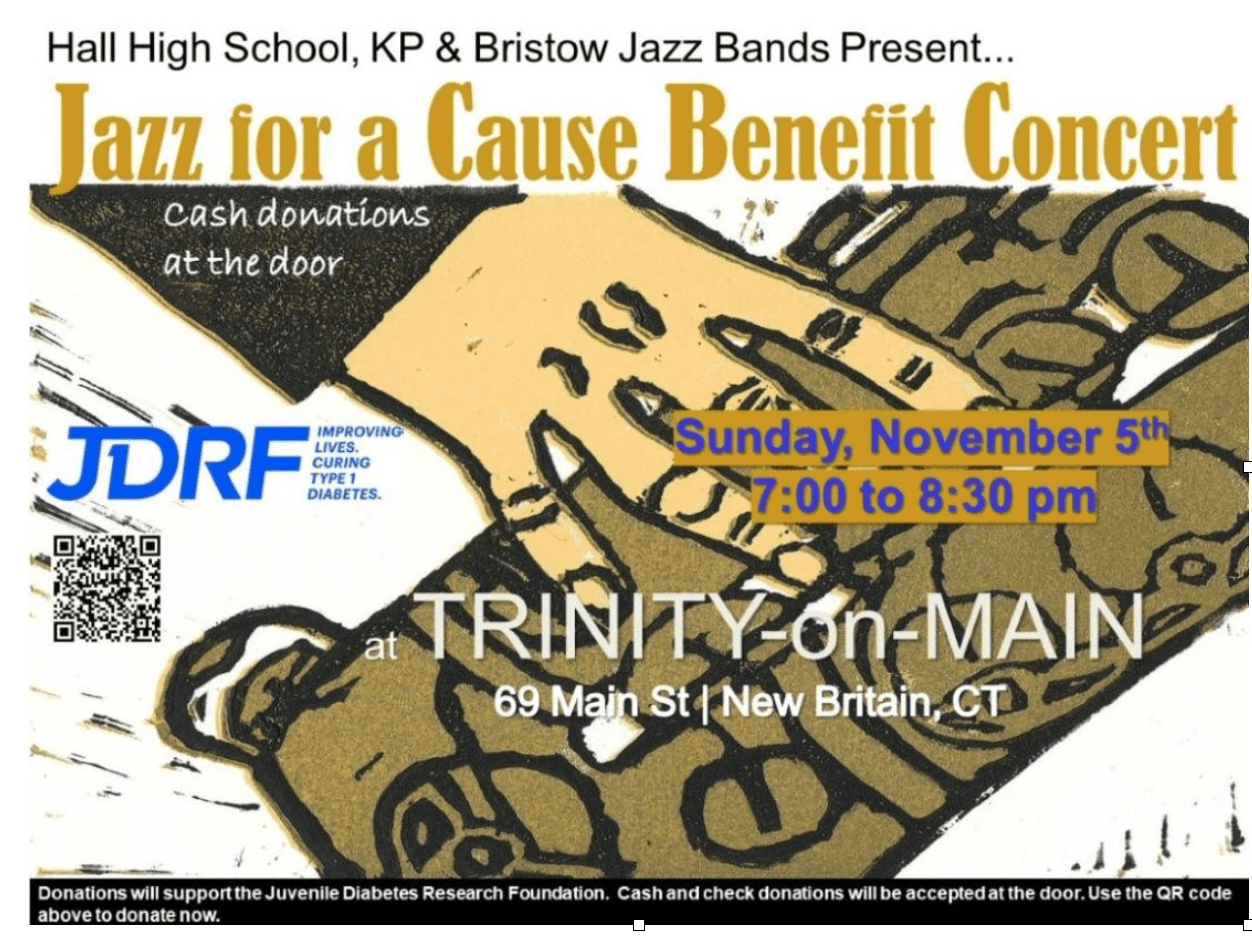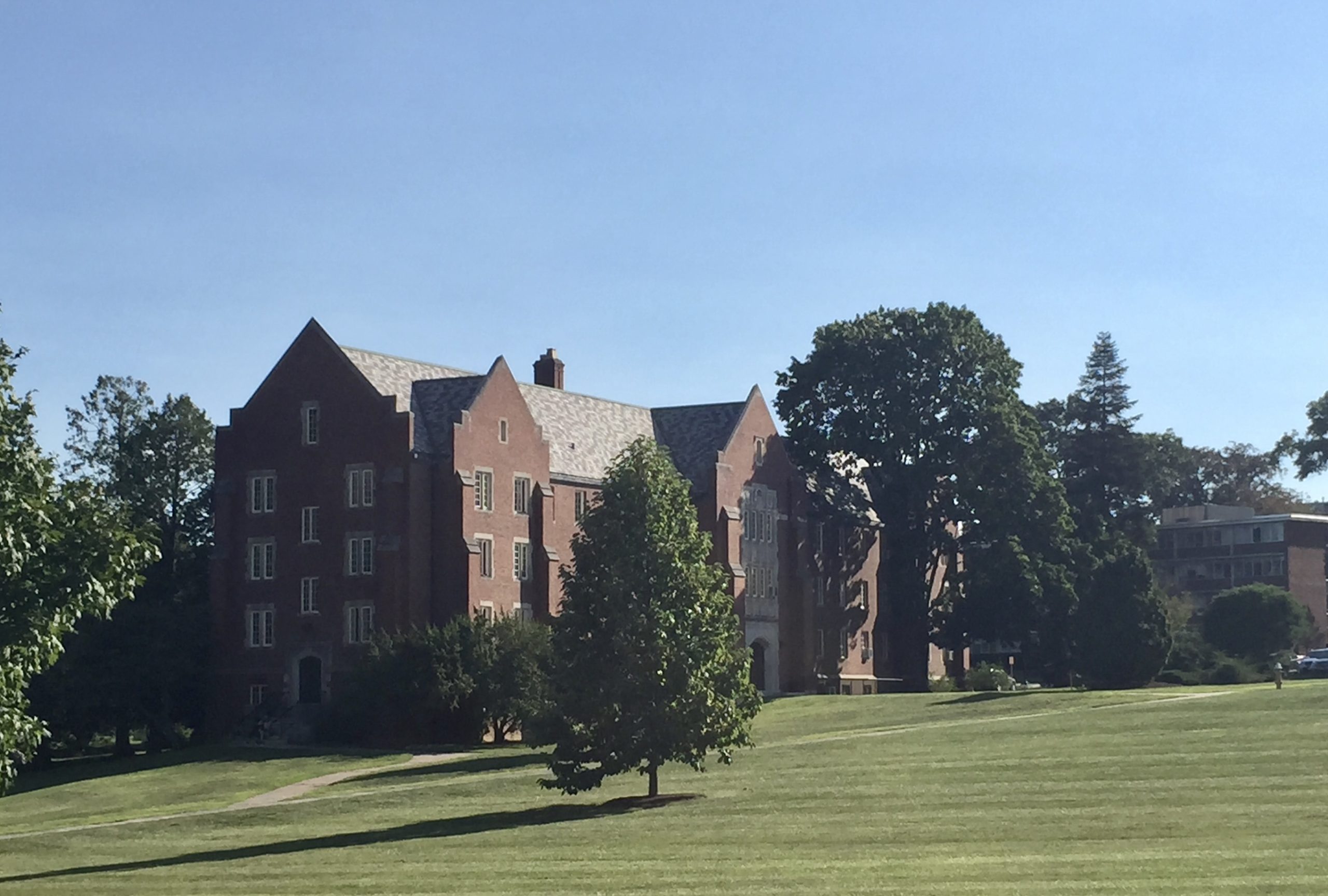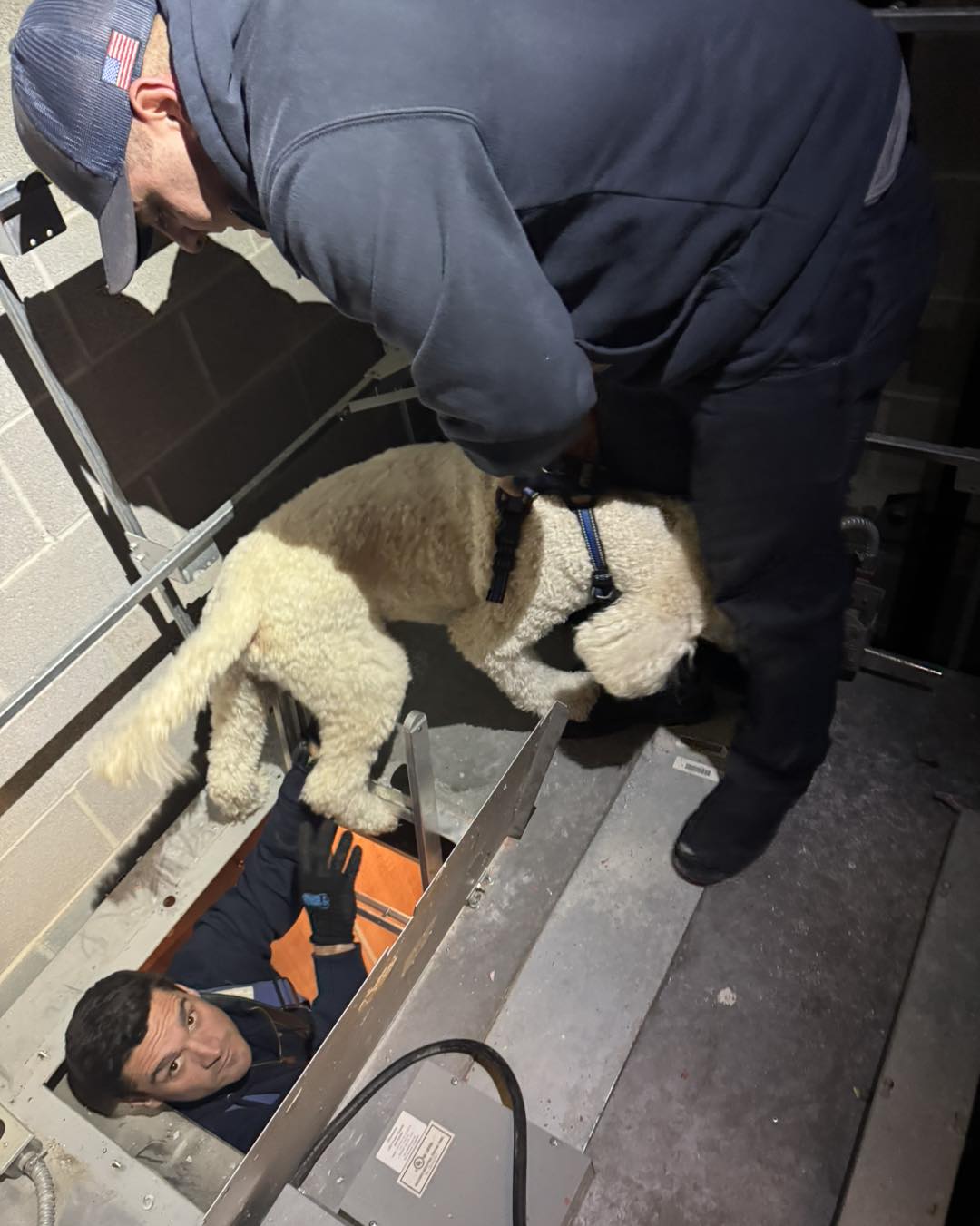Hall Jazz Bands ‘Jazz for a Cause’ Concert To Benefit Juvenile Diabetes Research Foundation

Audio By Carbonatix

Band members chose JDRF at the urgent plea of one of their fellow performers.
By Lori A. Beste
Hall High School’s Concert Jazz Band is excited to announce that the Juvenile Diabetes Research Foundation (JDRF) will be the recipient of all donations collected at this year’s “Jazz for a Cause” Benefit Concert to be held on Sunday, Nov. 5 at 7 p.m. in the historic cultural center Trinity-on-Main at 69 Main Street in New Britain. Parking is free on the street or in the garages on Sunday evenings.
Students will collect donations at the door, through the QR code found on the poster, and online through their fundraising portal.
Collecting donations to support JDRF has a personal connection for the students this year because they know people in their community who live with Type 1 Diabetes (T1D). Concert Jazz Band trumpeter Kyriakos Papasavas was diagnosed with T1D two years ago and knows the struggle of learning how to live with this chronic disease. When discussions about the benefit concert began this year, he passionately advocated for the band to support JDRF. “This felt like a chance to raise awareness in a very personal way,” he said.
To inspire and rally his fellow band members around the cause, he wrote a post to share with his friends that explained how T1D comes about and how hard it is for people to manage. He wrote, “This autoimmune disease was brought upon us through no fault of our own. It cannot be prevented or cured with diet or lifestyle changes like Type 2 Diabetes. In T1D, the body attacks its own cells—namely, the beta cells of the pancreas—destroying their ability to produce insulin. Living with T1D is a difficult full-time management act, as blood-sugar levels fluctuate based, for instance, on food, stress, exercise, or hormone changes; it requires multiple doses of insulin throughout the day and adherence to a strict dietary regimen.
“People with poor control of their diabetes may develop kidney failure, blindness, and disease of the lower extremity arteries, leading to amputations. In addition, low blood sugars can cause fainting and even coma in some cases.” These words were enough to persuade other band members to choose JDRF for this year’s cause.
Many of the students describe feeling a personal connection to this year’s fundraising efforts through Papasavas and others they know who live with T1D. Concert Jazz Band saxophonist Chloe Madrak, who has been previously involved in the band’s process of choosing a charitable organization, said, “This is a little bit different from past years because this year’s organization (JDRF) feels more personal, and it’s awesome that we have the opportunity to raise money which can help out people in our community.”
Papasavas is grateful for this kind of support from his fellow band members and says it demonstrates their understanding and empathy for him and others who live with T1D. “They (the band members) let us know that we’re not alone,” he said. “I’m very proud to be part of this tight-knit and warm musical family. Our band believes that music has the power to heal and uplift; supporting JDRF through our concert is allowing us to do just that.”
In order to support people living with T1D, the Juvenile Diabetes Research Foundation (JDRF) has a three-point mission: funding groundbreaking research, advocating for change, and supporting the Type 1 Diabetes (T1D) community. Since its founding in 1970 by parents determined to find a cure for their children with T1D, JDRF has committed over $2.5 billion in research grants. Over the past 15 years, for example, JDRF has designated more than 140 million dollars to artificial pancreas research. Now, people with T1D, including children, have the option to choose from several artificial pancreas technologies for help with insulin regulation and monitoring.
In addition, JDRF also advocates for keeping treatments and technologies affordable for people with T1D. As a result of advocacy efforts, all 25 of the U.S.’s largest private health insurers provide coverage for an artificial pancreas system for people with T1D. Navigating life with T1D can be difficult, especially at the start. JDRF is there for newly diagnosed people by providing introductory care kits for children, teens, and adults. More than 30,000 people have joined JDRF’s TypeOneNation to participate in monthly “summits,” or virtual educational information sessions in English and Spanish, to help people live with T1D and to learn about new developments in diabetes research and treatments.
Raising funds and awareness for such a worthy cause is the main purpose of the concert, but having fun and putting on a great performance is also part of the event. The Hall High School jazz bands will be joined again this year by the middle school jazz bands. Madrak, like other jazz band students, fondly recalls playing at Trinity-on-Main during their middle school years. “It’s a very nostalgic sort of experience,” says Madrak. “I remember being in middle school watching the high school bands; it was so inspiring for me, and now I get so excited seeing so many middle school students having the same experience.”
Students also enjoy performing at Trinity-on-Main because it is so different from their usual performance spaces. Concert Jazz Band saxophonist Sarah Jane Mielcarek describes Trinity-on-Main as a cozy and welcoming venue and says, “It’s perfect for our ‘Jazz for a Cause’ performance because of how intimate the space is. It allows the audience to really feel the music and cultivates an uplifting atmosphere that feels great to play in.”
Papasavas echoes her enthusiasm. “The space allows for a sense of togetherness and community. As a former church, it is a place with a history of unity and support. So, the setting aligns perfectly with the spirit of ‘Jazz for a Cause.’ It feels like we’re not just performing but uniting with the community to make a difference.”
Hall High School jazz bands have already collected nearly $120 in small donations from their friends at school and hope that members of the local community will join in this effort. If you cannot attend, please consider donating through one of the students’ donation points: use the QR code in the poster above or follow this link to the students’ fundraising portal.
To learn more about artificial pancreas technologies, care kits, TypeOneNation, and all the work of the JDRF, go to their website at www.jdrf.org. You may also contact the local office by email at [email protected] or by calling 860-470-0020.
Like what you see here? Click here to subscribe to We-Ha’s newsletter so you’ll always be in the know about what’s happening in West Hartford! Click the blue button below to become a supporter of We-Ha.com and our efforts to continue producing quality journalism.



